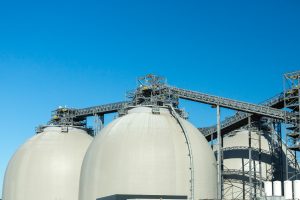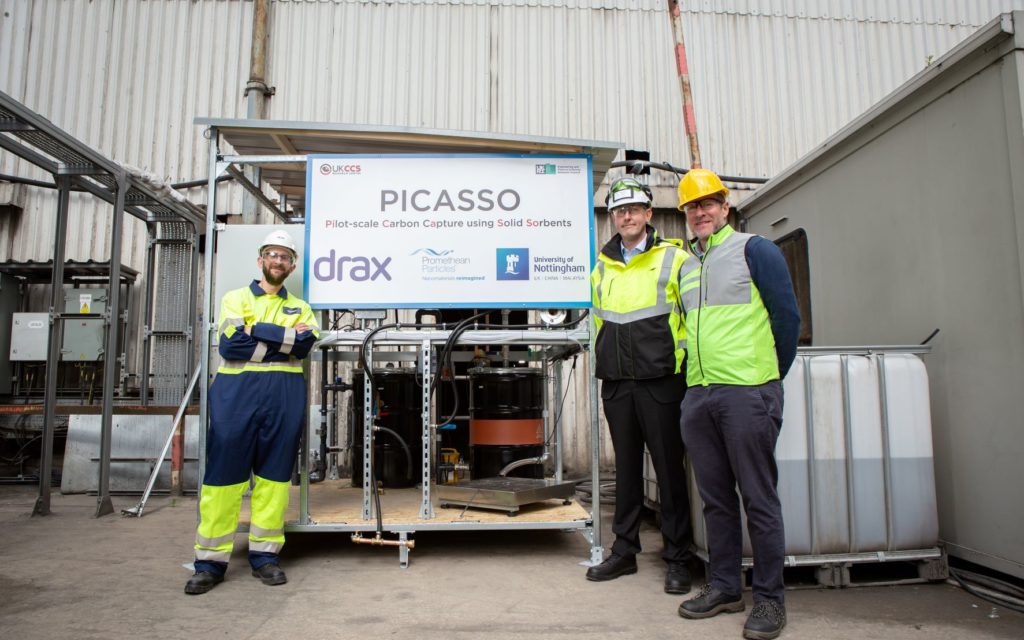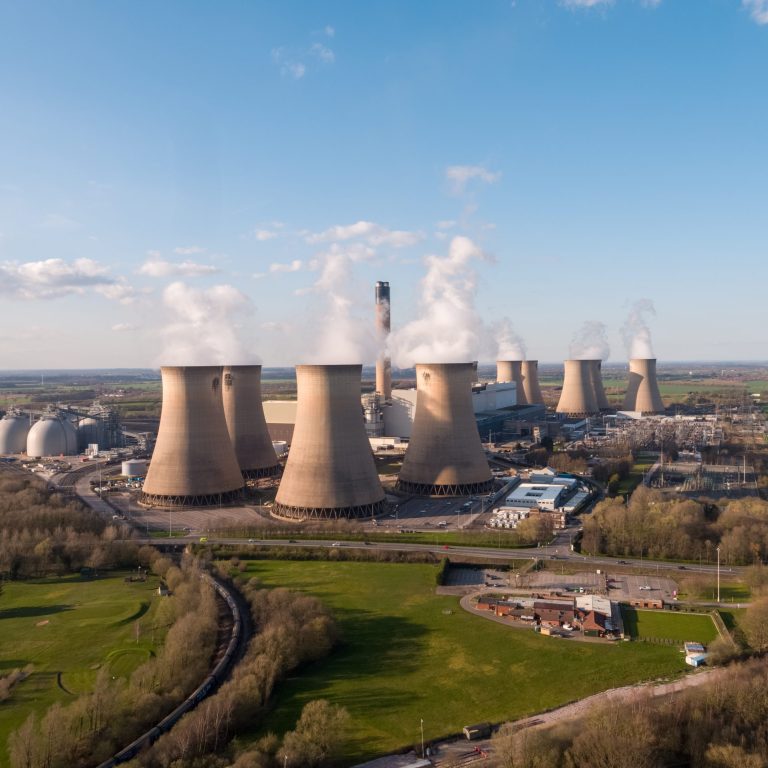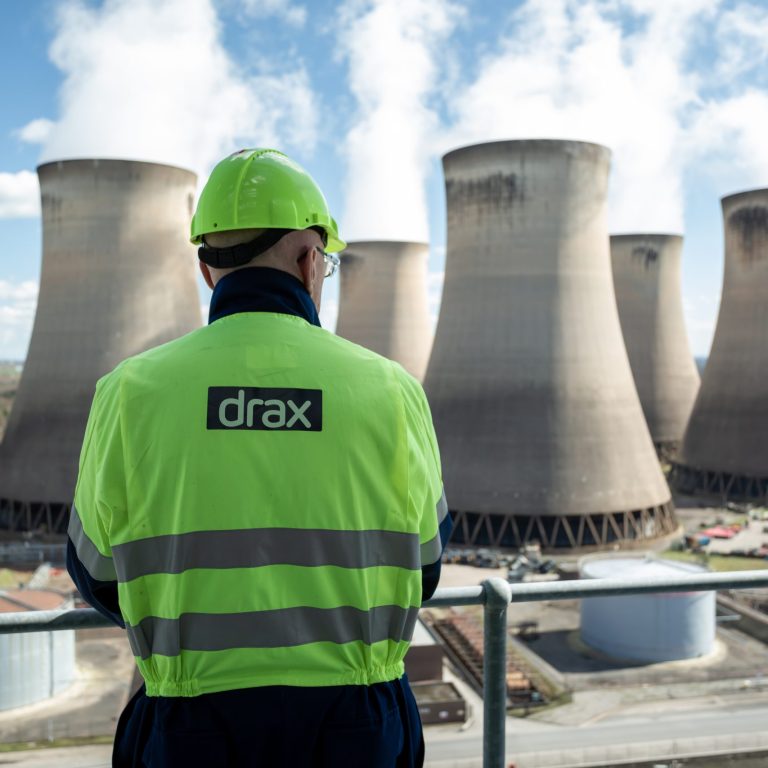- Renewable energy giant Drax is collaborating with the University of Nottingham and Promethean Particles on an innovative new carbon capture technology that could shape the future of carbon capture and storage (CCS).
- Trial is part of Drax’s bioenergy with carbon capture and storage (BECCS) innovation programme and could see the technology deployed in future BECCS plants.
The new process uses a type of solid sorbent called metal-organic frameworks (MOFs), which Promethean Particles are a global pioneer in the development and deployment of, to capture the CO2 released when sustainable biomass is used to generate electricity. CCS technologies typically use liquid solvents.
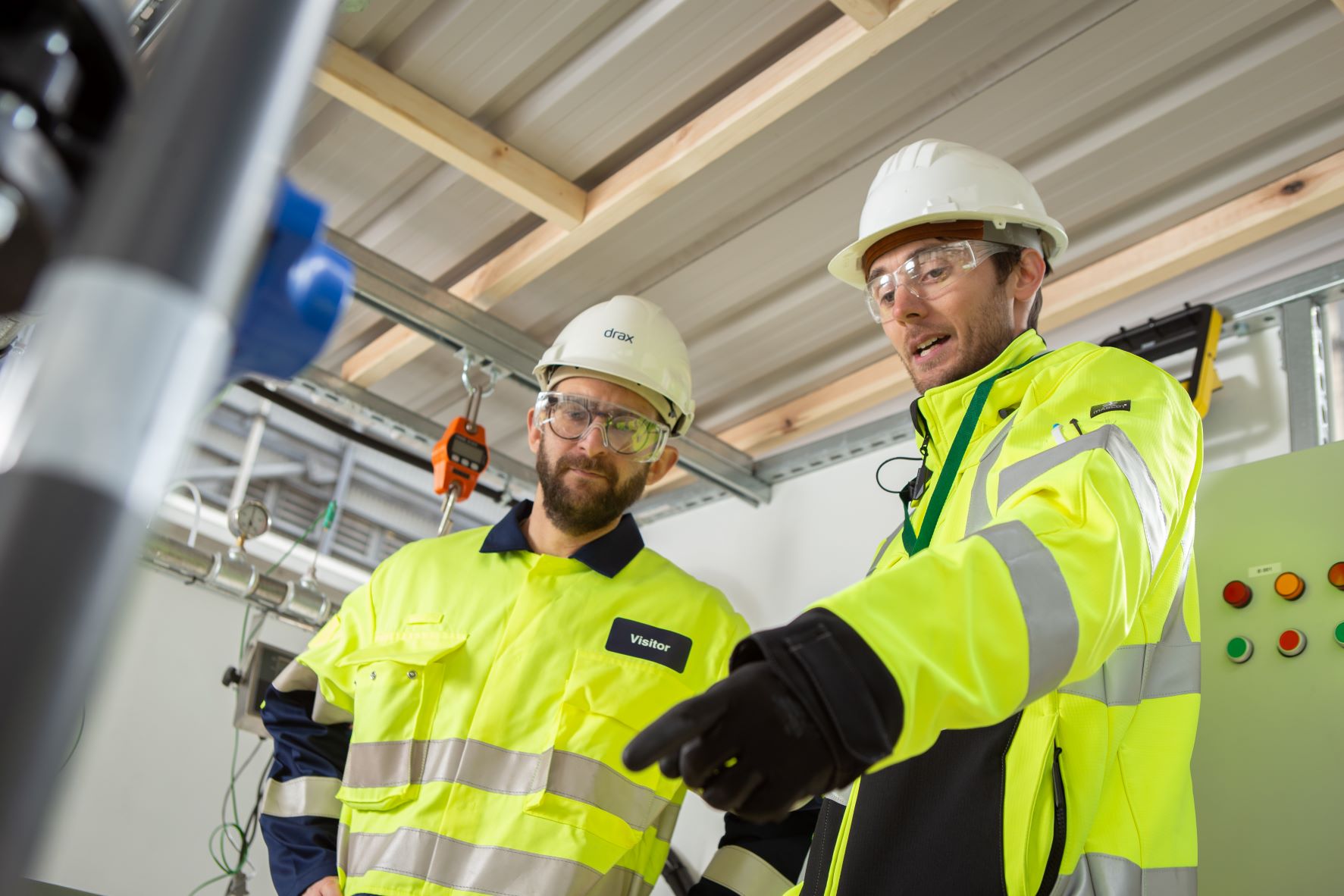
Dr Theo Chronopoulos, Drax Innovation Engineer and Lewis Neve, Promethean Particles’ Engineering Manager.
MOFs have a simple structure, which means they can be tailored to separate and soak up specific molecules making them excellent for CCS.
The trial will last for two months and will allow all three organisations to understand if this new carbon capture process performs well in real conditions on large-scale projects.
Jason Shipstone, Drax’s Chief Innovation Officer, said:
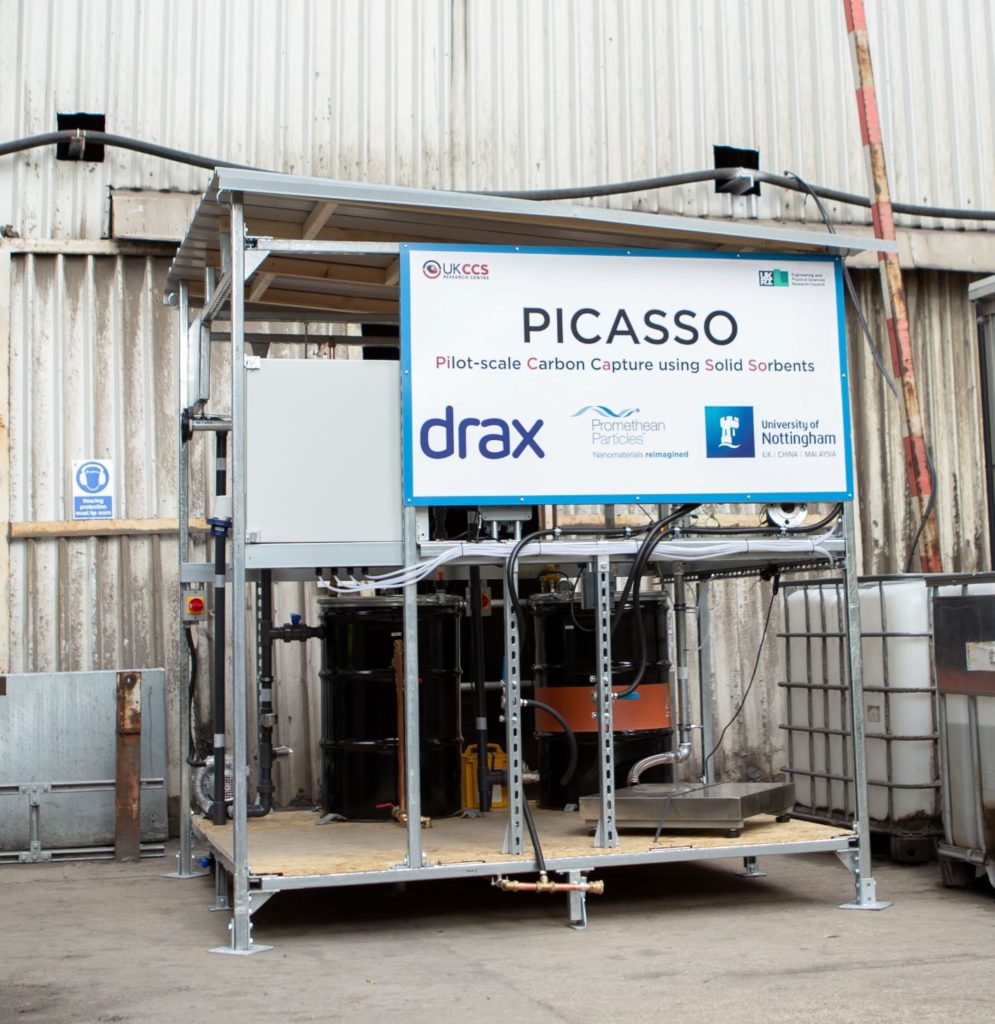
Pilot unit in situ in Drax’s BECCS incubation hub located in Drax Power Station.
“Negative emissions technologies like BECCS will play a vital role in the fight against the climate crisis, so it’s crucial we continue to innovate and develop new technologies that will support their future deployment.
“This partnership with the University of Nottingham and Promethean Particles is part of our long-term innovation programme and will allow Drax to understand the future potential of this technology, as we continue to innovate and grow as a business.”
Professor Ed Lester, Project Lead, University of Nottingham, said:
“This is a fantastic opportunity to showcase how these solid adsorbents perform in an industrial setting. We know that this project is gathering a lot of interest across many industrial sectors that currently generate large amounts of CO2”.
James Stephenson, CEO of Promethean Particles, said:
“There is exciting potential for MOFs to deliver a more efficient CCS. By collaborating with Drax and the Uni, we can show how they can perform in a real industrial setting and drive a step change in their availability and cost effectiveness.”
Drax Group, which has converted Drax Power Station in North Yorkshire to use sustainable biomass instead of coal to become the UK’s largest renewable generator, plans to deploy the essential negative emissions technology BECCS in the 2020s. This would be the world’s largest carbon capture power project, delivering a significant proportion of the negative emissions needed for the UK to meet its climate targets.
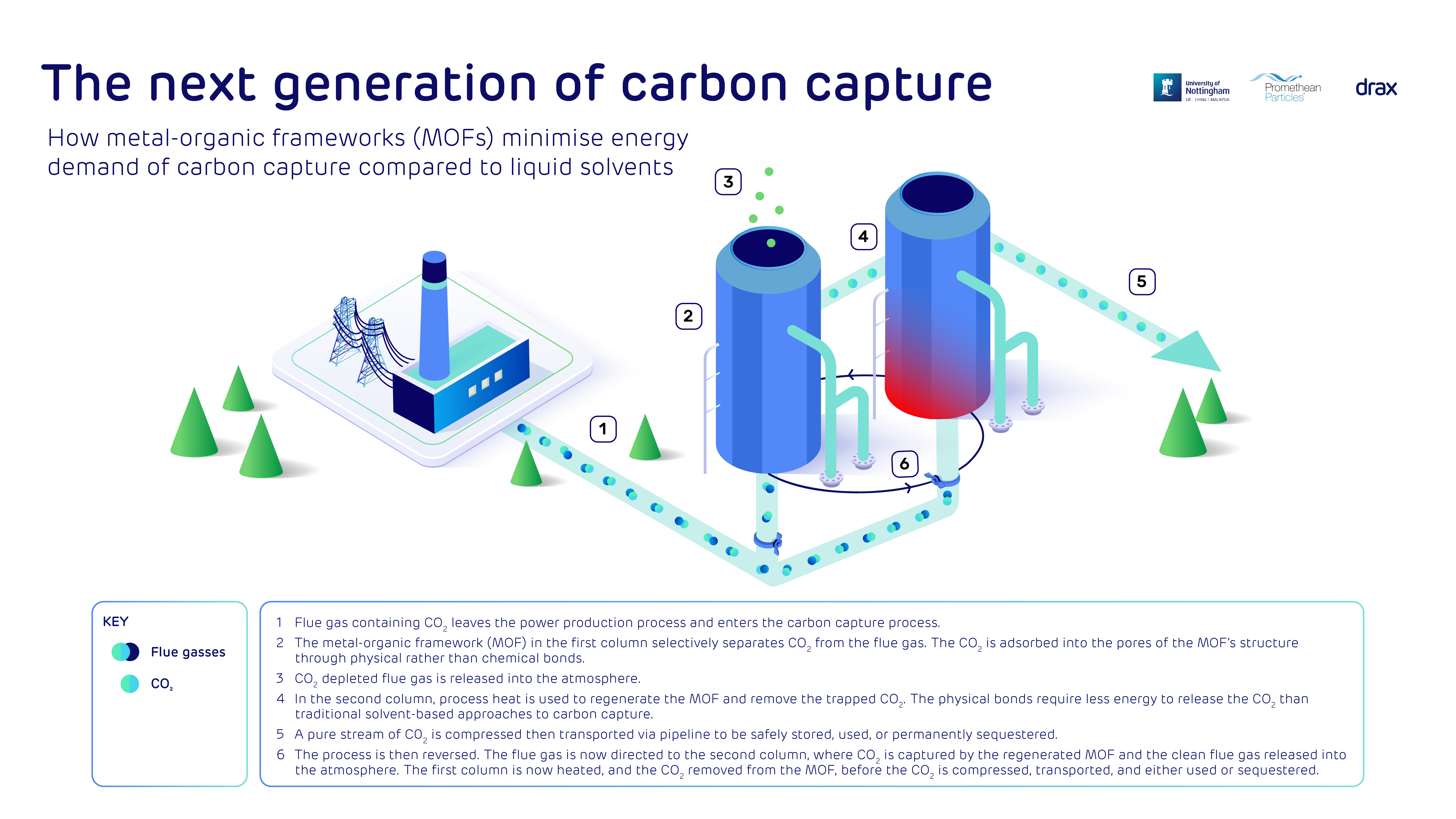
Infographic showing the new carbon capture process [click to view/download]
ENDS
Media contacts:
Ben Wicks
Media Manager
E: [email protected]
T: 07762 525 661
Featured image caption: Dr Theo Chronopoulos, Drax Innovation Engineer, James Stephenson, Chief Executive of Promethean Particles, and Professor Ed Lester, University of Nottingham.
Editor’s Notes
- The trial will last for two months and will be hosted within Drax’s BECCS incubation hub at its North Yorkshire Power Station.
- Metal Organic Frameworks are a unique class of solid sorbents offering lower operational costs and reducing potential environmental impacts.
- Leading climate scientists at the UN’s IPCC and UK Climate Change Committee have said that negative emissions technologies such as BECCS, which permanently remove carbon dioxide from the atmosphere, are vital to achieve climate targets
- Work to build BECCS at Drax could get underway as soon as 2024, with the creation of thousands of jobs.
- Subject to the right regulatory support, the first BECCS unit could be operational in 2027, with the second commissioned in 2030, enabling Drax to achieve its world-leading ambition to be a carbon negative company by 2030.
- Analysis by Baringa shows BECCS at Drax will save the UK £13bn in achieving the government’s legally binding fifth Carbon Budget.
About Drax
Drax Group’s purpose is to enable a zero carbon, lower cost energy future and in 2019 announced a world-leading ambition to be carbon negative by 2030, using Bioenergy with Carbon Capture and Storage (BECCS) technology.
Drax’s around 3,000 employees operate across three principal areas of activity – electricity generation, electricity sales to business customers and compressed wood pellet production and supply to third parties. For more information visit www.drax.com
Power generation:
Drax owns and operates a portfolio of renewable electricity generation assets in England and Scotland. The assets include the UK’s largest power station, based at Selby, North Yorkshire, which supplies five percent of the country’s electricity needs.
Having converted Drax Power Station to use sustainable biomass instead of coal it has become the UK’s biggest renewable power generator and the largest decarbonisation project in Europe. It is also where Drax is piloting the groundbreaking negative emissions technology BECCS within its CCUS (Carbon Capture Utilisation and Storage) Incubation Area.
Its pumped storage, hydro and energy from waste assets in Scotland include Cruachan Power Station – a flexible pumped storage facility within the hollowed-out mountain Ben Cruachan.
The Group also aims to build on its BECCS innovation at Drax Power Station with a target to deliver 4Mt of negative CO2 emissions each year from new-build BECCS outside of the UK by 2030 and is currently developing models for North American and European markets.
Pellet production and supply:
The Group has 17 operational pellet plants and developments with nameplate capacity of 4.6Mt, which will increase to c.5Mt once developments are complete.
Drax is targeting 8Mt of production capacity by 2030, which will require the development of over 3Mt of new biomass pellet production capacity. The pellets are produced using materials sourced from sustainably managed working forests and are supplied to third party customers in Europe and Asia for the generation of renewable power.
Drax’s pellet mills supply around 30% of the biomass used at its own power station in North Yorkshire, England to generate flexible, renewable power for the UK’s homes and businesses.
Customers:
Drax is the largest supplier of renewable electricity to UK businesses, supplying 100% renewable electricity as standard to more than 370,000 sites through Drax and Opus Energy.
It offers a range of energy-related services including energy optimisation, as well as electric vehicle strategy and management.
To find out more go to the website www.energy.drax.com
About The University of Nottingham
The University of Nottingham is a research-intensive university with a proud heritage. Studying at the University of Nottingham is a life-changing experience, and we pride ourselves on unlocking the potential of our students. We have a pioneering spirit, expressed in the vision of our founder Sir Jesse Boot, which has seen us lead the way in establishing campuses in China and Malaysia – part of a globally connected network of education, research and industrial engagement. Ranked 103rd out of more than 1,000 institutions globally and 18th in the UK by the QS World University Rankings 2022, the University’s state-of-the-art facilities and inclusive and disability sport provision is reflected in its crowning as The Times and Sunday Times Good University Guide Sports University of the Year twice in three years, most recently in 2021. We are ranked eighth for research power in the UK according to REF 2014. We have six beacons of research excellence helping to transform lives and change the world; we are also a major employer and industry partner – locally and globally. Alongside Nottingham Trent University, we lead the Universities for Nottingham initiative, a pioneering collaboration which brings together the combined strength and civic missions of Nottingham’s two world-class universities and is working with local communities and partners to aid recovery and renewal following the COVID-19 pandemic.
About Promethean Particles
Promethean Particles is a leading global pioneer in the development and high-volume manufacture of high specification, cost-effective nanomaterials. Products manufactured by Promethean, including metal-organic frameworks (MOFs), have broad utility in a number of applications and are increasingly being deployed in the fight against climate change and in energy-sensitive applications, including carbon capture.
Promethean has developed a unique and patented continuous-flow reactor, which dramatically improves process reproducibility and reliability, whilst providing the scale necessary for nanomaterials to be considered a viable industry solution. The company has full scale manufacturing capabilities at its site in Nottingham, UK, where it operates the world’s largest continuous flow nanomaterial manufacturing plant.
For more information on Promethean Particles and its activities, please contact Promethean Particles Ltd., 1-3 Genesis Park, Midland Way, Nottingham, NG7 3EF.
Tel: +44 (0)115 967 8119 or email: [email protected]




